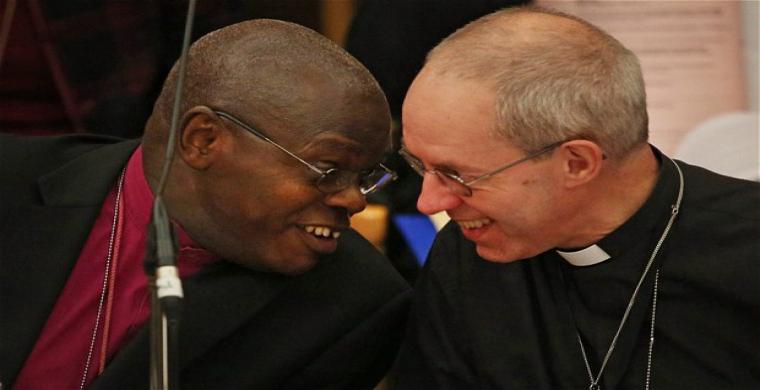YORK: Day 2 - Religious Freedom, Jim Wallis Speaks, Clergy Robes Occupy Synod Minds
By Chris Sugden in York
http://anglicanmainstream.org/today-in-synod-july-12/
July 12, 2014
The morning began with a presidential address by the Archbishop of York. The longest debate of the morning concerned what to do with the ‘rotten borough’ of the university representatives on synod. This had given single universities of Oxford, Cambridge and Durham a representative each from very small electorates.
First time inclusion of theological college staff in universities’ electorate
Synod agreed that the universities in each province shall together constitute a single electoral area with four representatives with at least one candidate from each of the Provinces. The criteria for the electorate and the candidates will be that they be a priest or deacon who is authorized to officiate in a diocese, is employed to teach and research by a college of such a university, or is a fellow of a college, or is employed to teach and research on at least a half-time basis by a theological education institution in one of the provinces recognized for ordination training in the Church of England. The objective is to provide people with theological expertise for the synod.
The critical change is to open this electorate and its candidates to ordained staff of theological colleges as well as ordained staff of universities. One principal of a theological college declared that they were delighted with this development after the debate.
Religious freedom and persecution
At a fringe meeting over lunch Baroness Elizabeth Berridge spoke of the work of the All Party Parliamentary Group for International Freedom of Religion and Belief (www.freedomdeclared.org) and encouraged people to write to their MPs in the run up to the 2015 General Election asking what they are doing about the persecution of people of faith: “Your currency is increasing in value every day” she said. A psychologist Richard Blacker spoke of the greatest crisis facing the Christian church is the current level of persecution. He explored reasons why this is being sidestepped by the politicians, by the mainstream media and even met with apathy by some Christians. “We never saw this coming” is a common excuse used by politicians, along with “the Christians had it coming to them because of past injustices of the crusades, colonialism etc.” Everyone failed to take account of human sin of which persecution is an inexcusable manifestation. Only the church has the cure for this but in the 1930s were abject failures at condemning the persecution of Jews which led to the holocaust. Concern was also expressed at the failure of the BBC to report fairly on issues of persecution, for example having no broadcasts to or from North Korea.
The Common Good – Jim Wallis
In the afternoon Jim Wallis of the Sojourners Community addressed synod on “The Common Good”. He is currently engaged on changing the law and attitudes to immigration in the United States. His next project will be to address the broken criminal justice system there. He noted that only 20% of all prisoners in the USA were only visited once. He concluded that the most effective work in this area would come from people on the ground in their homes, parishes and communities working for neighbourliness.
Afterwards the synod passed a motion that called on churches at local level, along with diocesan and national Church bodies, to ensure by word and action that the political parties are challenged to promote the common good when drawing up their manifestos for the 2015 General Election.
Clergy Robes – optional?
In the evening we had a surprisingly enjoyable debate that had the flavour of an after dinner speech. The subject was whether to amend the canon requiring clergy to wear robes at morning and evening prayer and services of Holy Communion so that they be optional as is in fact the practice in many churches. The Bishop of Salisbury conjured up the vision of himself riding through the streets of central London on his bike in his robes on his way to and between a number of services, lunches and dinners. Dr. Mark Chapman gave us a history lesson of the failure of the Archbishop of Canterbury in the sixteenth century to enforce compliance so felt he could not see the current incumbent of the post enforcing compliance on the Bishop of London. The Bishop of Gloucester, soon to retire, gave a masterclass in episcopal wisdom and effectively set out the criteria for when and where robes could be dispensed with. “People know they are breaking the canon by not wearing robes. But it can be done if the PCC and vicar agree and inform (not ask) the bishop.” His speech swung the synod behind the Private Members motion brought by Rev Christopher Hobbs which was passed:
“ That this Synod call on the Business Committee to introduce draft legislation to amend the law relating to the vesture of ministers so that, without altering the principles set out in paragraphs 1 and 2 of Canon B8, the wearing of the forms of vesture referred to in paragraphs 3,4, and 5 of that Canon becomes optional rather than mandatory.”
On Sunday it is morning worship in York Minster with Jim Wallis preaching followed by discussion of alternative baptism liturgies in the afternoon. Sin is back but not the devil – yet.
The Rev. Dr. Chris Sugden of Anglican Mainstream is reporting on Synod for Virtueonline














